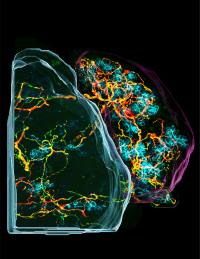Schwann cells are the main glial cells of the peripheral nervous system and are known for their role in nerve regeneration after injury. In a study published in Glia, researchers Martha Montserrat Rangel Sosa, Fanny Mann, and Sophie Chauvet discovered that these cells also play a critical role in cancer-related nerve remodeling.
This work builds on the team’s previous research in pancreatic cancer, which showed that sympathetic nerve fibers extensively sprout in pancreatic lesions and help protect against tumors. This study found a strong association between non-myelinating pancreatic Schwann cells (nm-pSCs) and sprouting sympathetic nerve terminals. These nm-pSCs were found to proliferate more, change shape, and express the nerve growth factor GDNF. When the GDNF gene in these cells was knocked out, nerve sprouting was prevented.
These findings show that Schwann cells can reprogram themselves to promote nerve remodeling in response to cancer, suggesting that they may represent a new cellular target for cancer treatment.
Rangel-Sosa MM, Mann F, Chauvet S. Pancreatic Schwann cell reprogramming supports cancer-associated neuronal remodeling. Glia. 2024 Jul 3. doi: 10.1002/glia.24586. Epub ahead of print. PMID: 38961612.




